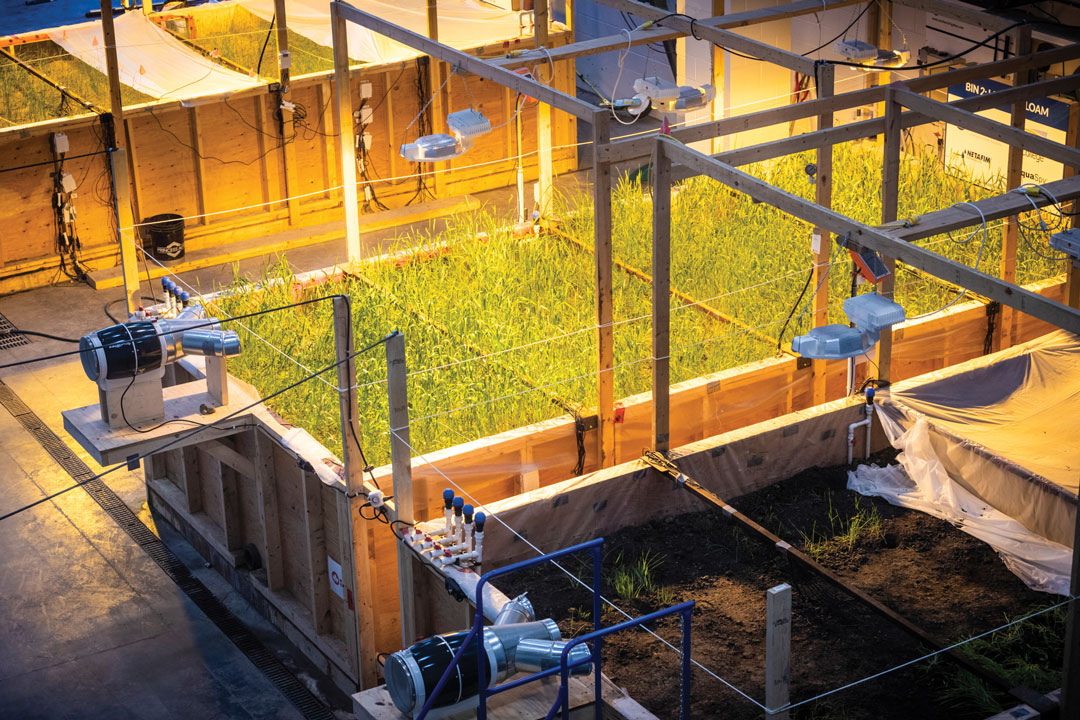MAKE IT WORK
BY JENNIFER BARBER • PHOTO COURTESY OF LETHBRIDGE COLLEGE
The newly launched Integrated Agriculture Technology Centre (IATC) at Lethbridge College uses the school’s applied research expertise to advance innovative ag-tech ideas. Funded by a five-year, $1.75 million Natural Sciences and Engineering Research Council grant received in April of 2020, it works with small- and medium-sized agribusinesses to take their products, processes and services to market. With this technology access centre [TAC] grant, the centre helps such entrepreneurs conduct research, test their products and boost productivity. In its first year of operation, the centre assisted 18 companies to secure more than $500,000 worth of external funding, which includes grants and cash from private investors.
Comprised of 19 employees, the centre’s team worked with companies such as Random Acronym and Jadler Industries, which produced FieldTracker, a soil moisture monitoring tool. The technology the tool uses had previously been employed in the oil and gas sector. The centre also worked with OPI Systems to test recently developed cloud-based grain management hardware and software.
Lethbridge College has conducted applied agricultural research for more than 30 years, and the centre expands upon this legacy. “The IATC is a catalyst for economic growth, sustainability and social development in the region,” said Megan Shapka, associate dean of its Centre for Applied Research, Innovation and Entrepreneurship.
The college is one of 60 Canadian TACs tasked with providing specific industries with affordable and accessible research and development assistance. A focus on agriculture is a natural fit for the southern Alberta institution.
In submitting their application to the program, businesses with potentially lucrative ag-tech ideas are encouraged to determine the problem they need to solve, the expertise it will require and a timeline to resolve it. Businesses are matched with IATC staff in appropriate research areas. These include post-harvest technology, irrigation, aquaculture and aquaponics and greenhouse technology. If a match is not possible, the centre can refer businesses to other TACs across the country as well as additional post-secondary institutions.
Chandra Singh is the College’s research chair in agricultural engineering technology. His work focuses on post-harvest technology, and he helps the centre’s clients determine how their products and services measure up against real-world farming conditions. “We help them create deliverables and outcomes for the projects and then we also help them seek funding opportunities through various grants if necessary to meet their goals,” said Singh. “We do the field trials and technical evaluations of their products and then they get to decide if they want to include the product in their offerings, or if they would like us to do further research so that the product can be improved.”
“The results we’ve seen have shown some of the strengths and some of the shortcomings of the devices we’re using,” said Marlon Fleming, director of Random Acronym. “The project as a whole was successful in that it allowed us to see what we could do differently, and that will help us with our future tests. It will also allow us to get a little bit closer to a real world deployment of this product.”







Comments